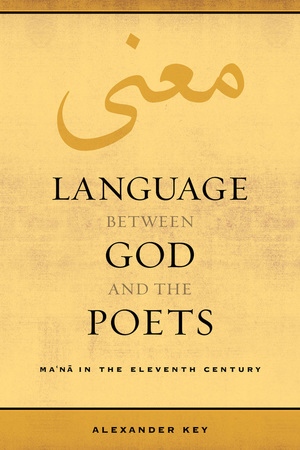Since first launching in 2015, Luminos has served as one of UC Press’s flagship open access programs. Having published more than seventy-five full length scholarly monographs—fully open and available to the public for free— in a variety of disciplines, Luminos embodies the University of California mission to provide high quality, innovative, peer reviewed research for widespread consumption and debate.
Given the recent need for increased remote work and academic participation, UC Press is delighted to highlight the breadth of Luminos’s scholarly disciplines.
Language between God and the Poets
Ma‘na in the Eleventh Century
by Alexander Key
“Alexander Key takes four major exponents of eleventh-century Arabic lexicography, theology, logic, and poetics and explores the interconnectedness of their thinking on ‘mental content’ and its various ‘accurate’ realizations. His explorations of the conceptual base and vocabulary shared by these thinkers convince. This book, brimming with philological insight, crackles with erudition.”
—James E. Montgomery, Sir Thomas Adams’s Professor of Arabic, Fellow of Trinity Hall, University of Cambridge
Bishops in Flight
Exile and Displacement in Late Antiquity
by Jennifer Barry
“This exciting book offers the first sustained examination of flight during times of persecution. Barry shows how early Christian leaders framed their flight as exile in defense of orthodoxy, a move to avoid being perceived as traitors that over time made flight into exile part of the episcopal experience. This book represents a significant contribution to the study of late antiquity that general readers are sure to find highly stimulating.”
—Susanna Elm, author of Sons of Hellenism, Fathers of the Church: Emperor Julian, Gregory of Nazianzus, and the Vision of Rome
The Eternal Dissident
Rabbi Leonard I. Beerman and the Radical Imperative to Think and Act
edited by David N. Myers
“The current regime has only made the urgency of this volume, a book that so powerfully and eloquently articulates a strong prophetic American Jewish stance, that much more important. Religion is not in the United States or for that matter elsewhere in the world only or exclusively the domain of the political right. This book shows us a genealogy, a legacy of alliance politics that is theologically and ethically bound to a shared vision of social justice.”
—Laura Levitt, Professor of Religion, Jewish Studies and Gender, Temple University, and author of American Jewish Loss after the Holocaust
Hindu Pluralism
Religion and the Public Sphere in Early Modern South India
by Elaine M. Fisher
“Fisher has excellent historical and philological skills that have enabled her to contribute a very important piece of scholarship that bears directly on the formation of the complex set of social, political, and religious beliefs and practices that constitute modern Hinduism. Her work is critical now more than ever in helping us to understand what Hinduism is and how it began to be that way, not in misty antiquity but in early modernity.”
—Robert P. Goldman, Catherine and William L. Magistretti Distinguished Professor of Sanskrit and India Studies, University of California at Berkeley
Morals Not Knowledge
Recasting the Contemporary U.S. Conflict between Religion and Science
by John H. Evans
“Morals Not Knowledge provides a roadmap for a more constructive dialogue, if not full reconciliation, between the two camps. . . . offers an engaging and intriguing reconceptualization of science, religion, and the nature of conflict between them. It is a must-read for social scientists whose work focuses on the interface between science and religion, and it will also be of interest to historians, scientists, theologians, and philosophers who study these issues. Evans makes a significant advance with this book, and it is likely to spur exciting new research in coming years to test and refine its claims.”
—American Journal of Sociology
Afghanistan’s Islam
From Conversion to the Taliban
edited by Nile Green
“Islam in Afghanistan has long been viewed as static and uniform, but this fine collection demonstrates that it has been far more contested and dynamic over the centuries than either Afghans or outside observers have realized. This book opens a door to that history to reveal a religious tradition that has constantly adapted itself to changing intellectual currents, local cultural beliefs, and political upheavals.”
—Thomas Barfield, Boston University





